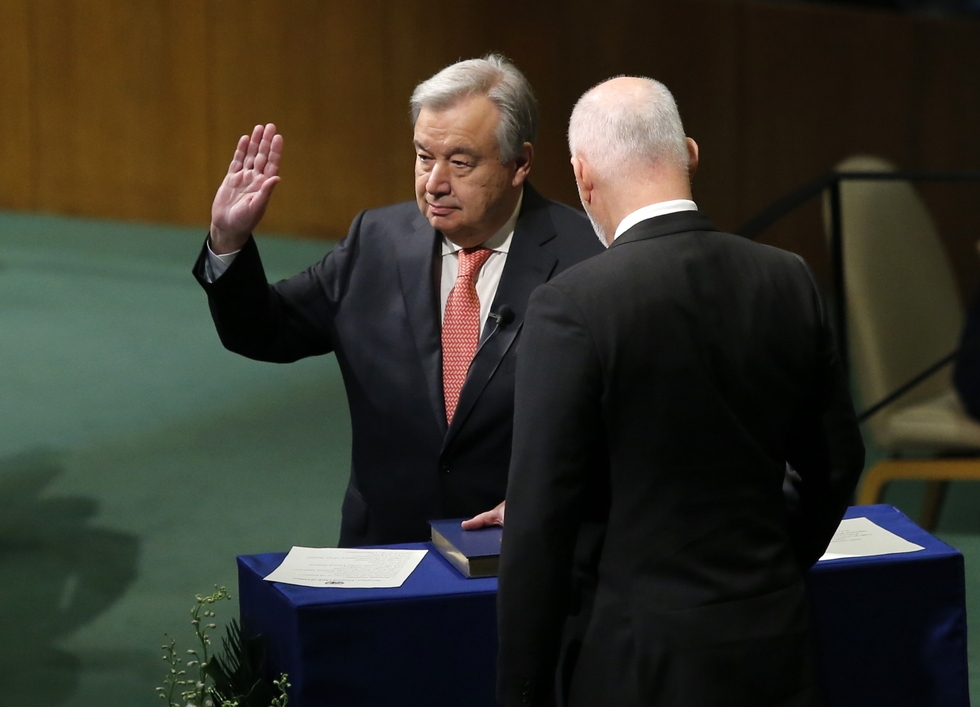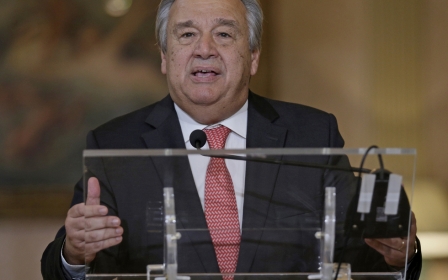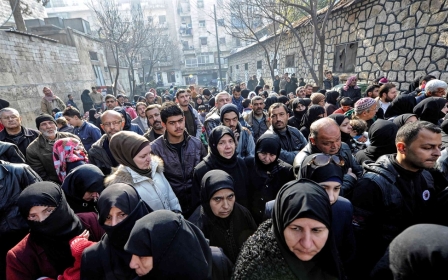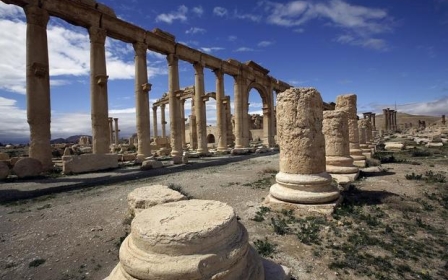New UN chief says Syria peace is top concern

UNITED NATIONS – The next head of the United Nations, Antonio Guterres, said on Monday that ending Syria’s war trumps other concerns in comments that suggest a greater willingness to accept a victory for President Bashar al-Assad’s government.
As Guterres spoke at UN headquarters in New York, Assad’s troops, backed by Iranian forces and Russian air power, continued operations against rebel holdouts in Aleppo that would mark a decisive government success in the long-running conflict.
“This a war in which nobody’s winning, this is a war in which everybody’s losing,” Guterres, 67, told reporters after taking the oath of office to replace Ban Ki-moon as UN secretary general on 1 January 2017. “It’s high time to put an end to this nonsense.”
The UN Security Council has often been deadlocked on Syria, with Russia backing Assad's government while US-armed rebels said the dynastic autocrat had butchered his own people and must step aside.
READ MORE: The new UN chief inherits poisoned chalice to solve Syria crisis
But with the six-year-old war shifting in Assad’s favour and with US president-elect Donald Trump signalling he is more amenable to Moscow, Guterres spoke of playing an “honest broker” in the elusive quest for peace.
“Whatever the contradictions that exist between member states, whatever the different perspectives that exist, I think there is a value that is above all,” said Guterres, who was elected in October in a series of polls.
“The value of peace in Syria corresponds to a necessity for us all, and I hope I will be able to help bring people together to this understanding.”
'Surge of diplomacy'
Guterres promised a “surge of diplomacy” when he takes over from Ban. The South Korean diplomat’s second five-year term ends this year after making gains against poverty and climate change but without any diplomatic breakthroughs on Syria.
'The value of peace in Syria corresponds to a necessity for us all' – Antonio Guterres
Ban was often at odds with Russia over Syria. Analysts say that Guterres may be more open to Moscow’s position that Assad’s government is the only legitimate and viable force against the so-called Islamic State (IS) group and other militants.
In Aleppo, anti-government rebels faced another night of heavy bombardment.
Lieutenant General Zaid al-Saleh, head of the government’s Aleppo security committee, said the Syrian army and its allies were in the “final stages” of recapturing Aleppo after an advance that had pushed rebels to the brink of collapse.
“The battle in eastern Aleppo should end quickly. They [rebels] don’t have much time. They either have to surrender or die,” Saleh told reporters in the recaptured Sheikh Saeed district of Aleppo on Monday.
Guterres will start work just weeks before Trump’s inauguration as US President. The Republican billionaire has indicated he is willing to cut deals with Russia in an effort to extricate America from foreign military entanglements.
Joshua Landis, a University of Oklahoma scholar, said Guterres’s appointment comes at a turning point in the six-year-old conflict that has claimed more than 400,000 lives and uprooted more than half of Syria’s 22 million people.
“It’s a good time to have a new director in the UN, because the world is coming around to the idea that al-Assad will win this battle, either imminently or in one or two years’ time,” Landis, an expert on Syria, told Middle East Eye.
“There are no powerful militias to replace the Syrian government; the UN will be put in a very difficult but important position of finding a way to deal with Assad and smoothing the return of Syrian refugees to an Assad-run Syria.”
Handling the refugee crisis
Landis pointed to Guterres’s experience managing the UN refugee agency from 2005 to 2015 as preparation for the UN task of helping some 4.8 million Syrians who fled to Turkey, Lebanon, Jordan, Europe and elsewhere to return home.
“One of the thorniest issues is guaranteeing that rebels associated with the Syrian opposition will be able to return home again and not face prison, torture or death,” Landis told MEE, adding that the “vast majority of refugees” are non-combatants who simply fled the violence.
“For them to go home, Syria has to rebuild. The West has placed a complicated maze of sanctions to hobble Syria’s economy. The return of refugees requires a new dialogue between the West and Syria, and that’s where the UN must set a new tone.”
Jonathan Cristol, a scholar from the World Policy Institute, a think tank, said both the UN and US are ceding influence on Syria’s conflict to Russia, which would likely result in fresh attacks on civilians designed to boost refugee flows and “destabilise Europe”.
“Guterres won’t be able to get anywhere near a genuine ceasefire in Syria, but he will make a difference in how the international community handles the refugee crisis more than in solving the problem at the source,” Cristol told MEE.
“Russia will be more willing to work with Guterres so long as he focuses on technocratic aspects of the refugee crisis rather than solving the miniature world war that is happening in Syria right now.”
Assaad al-Achi, executive director of Baytna, a Syrian civil society group, said hopes of creating a post-Assad transitional government will be “dead and buried” once government forces have taken eastern Aleppo.
'Russia will be more willing to work with Guterres so long as he focuses on technocratic aspects of the refugee crisis' – Jonathan Cristol, World Policy Institute
Guterres and his team need “out-of-the-box creative ideas”, al-Achi told MEE.
“There is no military solution even if the regime forces take over the rest of Syria militarily, it will not be stabilised or pacified, there will be pockets of resistance for a long time and if we thought Daesh was violent, we’ll see Daesh 2.0,” al-Achi added, using another name for IS.
The election of Guterres has energised UN diplomats who see him as a skilled politician, able to overcome divisions that have crippled the UN. Trained as an engineer, he entered politics in 1976 in Portugal’s first democratic election after a revolt against five decades of dictatorship.
New MEE newsletter: Jerusalem Dispatch
Sign up to get the latest insights and analysis on Israel-Palestine, alongside Turkey Unpacked and other MEE newsletters
Middle East Eye delivers independent and unrivalled coverage and analysis of the Middle East, North Africa and beyond. To learn more about republishing this content and the associated fees, please fill out this form. More about MEE can be found here.




